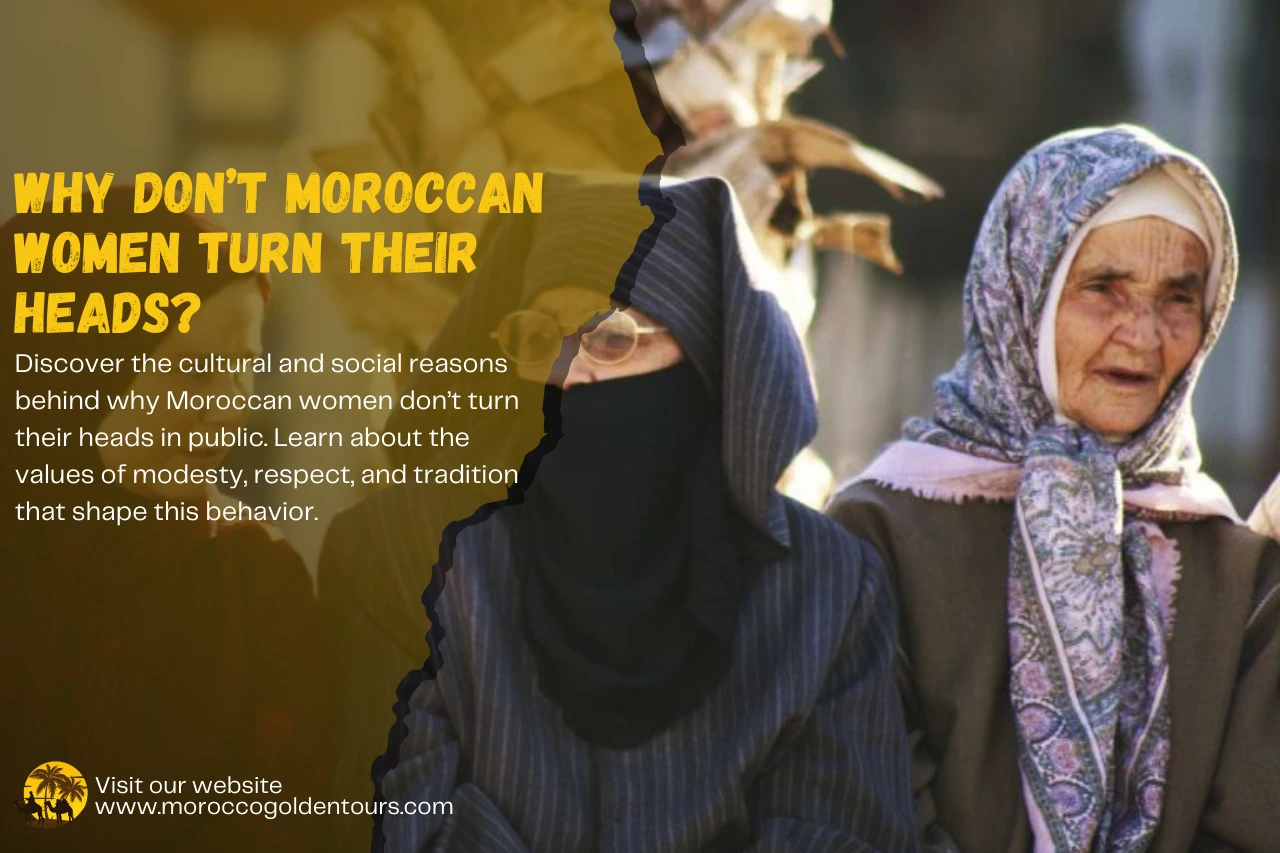Why Don’t Moroccan Women Turn Their Heads? Understanding the Cultural Significance

Have you ever walked through the busy streets of Morocco and noticed how Moroccan women rarely turn their heads when someone passes by? You might wonder why this happens, especially if you’re unfamiliar with the cultural norms of the region. The simple act of not making eye contact or turning one’s head in public could be puzzling for many, but it’s deeply rooted in Moroccan culture, values, and tradition.
In this article, we will explore why Moroccan women behave this way, shedding light on the cultural, social, and personal reasons behind this phenomenon. You will also understand how these behaviors reflect broader societal norms that have been ingrained for generations.
Table of Contents
The Cultural Context Behind Why Don’t Moroccan Women Turn Their Heads
To understand why Moroccan women don’t turn their heads in public, you need to first appreciate the cultural values that shape this behavior. In Morocco, modesty is a central principle, particularly for women. This value plays a significant role in how women present themselves in public spaces.
- Modesty is Key: Moroccan culture places a strong emphasis on modesty. It is considered inappropriate for women to attract attention in public. This is why Moroccan women avoid actions that might be seen as flirtatious or inviting unwanted interactions, such as turning their heads to acknowledge a stranger.
- Religious Influences: Islam, which is the predominant religion in Morocco, teaches the importance of modesty and respect. The concept of haya (modesty) extends to how women behave in public spaces. Turning one’s head or making prolonged eye contact may be seen as crossing boundaries and engaging in behavior that isn’t in line with these cultural values.
- Respect for Personal Space: In Morocco, personal space is highly valued. Turning your head in the direction of a stranger could be perceived as an invasion of that space, which is why Moroccan women choose to maintain distance and avoid making eye contact with unfamiliar people.
How Social Norms Shape Women’s Behavior in Morocco
Beyond cultural and religious influences, social norms also play a huge role in why Moroccan women don’t turn their heads in public. These norms are passed down through generations and are often reinforced by family, friends, and the broader community.
- Gender Expectations: In Moroccan society, there are clear distinctions between how men and women are expected to behave in public. Women are generally encouraged to act with discretion and dignity. This means avoiding any behavior that could be perceived as drawing attention to themselves, such as turning their heads or engaging in eye contact with strangers.
- Protecting Reputation: Reputation and honor are important in Moroccan society. For many Moroccan women, their behavior in public is closely linked to their family’s reputation. Turning one’s head toward a stranger might be viewed as a sign of improper behavior and could negatively affect a woman’s reputation.
- Public vs. Private Spaces: Women in Morocco are often expected to behave more reserved in public spaces, while in private settings, they may feel freer to express themselves. This cultural division between public and private life helps explain why Moroccan women may act more reserved when they’re outside, keeping their heads straight and avoiding unnecessary interactions.
The Difference Between Urban and Rural Life in Morocco
Morocco is a country where both urban and rural life have their unique customs. The behavior of Moroccan women can differ significantly depending on whether they live in a big city or a rural area.
- Urban Areas: In cities like Casablanca, Marrakech, or Rabat, women may have more opportunities to interact with people in public spaces. However, the cultural emphasis on modesty remains strong. Even in these urban settings, women tend to avoid direct eye contact or turning their heads toward strangers.
- Rural Areas: In rural parts of Morocco, traditional values are even more pronounced. Women living in these areas are often more closely tied to the customs and expectations of their communities. This means that they are even more likely to maintain a reserved and modest demeanor in public, which includes not turning their heads when walking through the streets.
- Changes Over Time: As Morocco continues to modernize, women in urban areas may have more freedom to engage in public interactions. However, they still tend to adhere to traditional norms regarding modesty, which means the behavior of not turning their heads remains relatively common, even in larger cities.
The Role of Moroccan Women in Modern Society
While tradition plays a significant role in shaping the behavior of Moroccan women, the modern world is gradually influencing these practices. As women become more empowered and integrated into the workforce and society, there are subtle shifts in how they behave in public.
- Women’s Empowerment: In recent years, Moroccan women have made strides in education, careers, and social engagement. This has led to changes in how women interact with the public, but many still choose to maintain modesty as an important part of their identity.
- Balancing Tradition with Change: Moroccan women are finding ways to balance their cultural traditions with the opportunities that come with modern life. They are increasingly navigating how to express themselves in public spaces while remaining respectful of the values of modesty and dignity.
- Breaking Stereotypes: While some may think of Moroccan women as passive or submissive due to their reserved behavior in public, many women in Morocco are active leaders in their communities. They play a crucial role in shaping the country’s future while maintaining their cultural values.
Why Don’t Moroccan Women Turn Their Heads? It’s About Respect
So, why don’t Moroccan women turn their heads? Ultimately, it all comes down to respect. The behavior reflects deep cultural values that prioritize modesty, dignity, and personal space. For Moroccan women, turning their heads toward strangers might be perceived as an inappropriate or disrespectful action, so they avoid it to maintain their honor and uphold the values they hold dear.
- Eye Contact and Modesty: In Moroccan culture, making eye contact can be interpreted as an invitation for conversation or a sign of flirtation, especially between men and women who are strangers to each other. Moroccan women avoid eye contact as a way to uphold their modesty and avoid unwanted attention.
- Respect for Personal Boundaries: By not turning their heads, Moroccan women are making a statement about their boundaries. It’s a way of protecting their personal space and ensuring that they are not subjected to the scrutiny of others.
Conclusion: Why Don’t Moroccan Women Turn Their Heads?
Now that you know why Moroccan women don’t turn their heads in public, it’s important to understand that this behavior is deeply ingrained in their culture and societal norms. The next time you visit Morocco, you’ll have a better understanding of the values that shape this reserved behavior, and you can appreciate it for what it truly represents: respect, modesty, and a strong sense of personal boundaries.
Remember, cultural differences are something to embrace and learn from. As you explore Morocco, keep an open mind and approach interactions with the knowledge that customs vary around the world. By respecting these norms, you’ll not only show your understanding but also gain a deeper appreciation for the rich traditions that make Morocco such a unique and beautiful place.
If you’re planning a trip to Morocco and want to learn more about its culture and how to navigate its traditions with respect, check out our website Morocco Golden Tours. We’ll help you explore the beauty of this incredible country while respecting its cultural norms!




